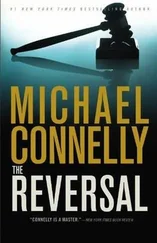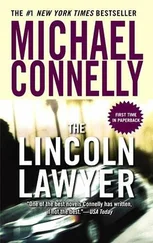Ballard then hugged her dog and this time it was she who was reassured, by Lola’s calm and stoic presence. She finally went into the hallway bathroom. She sat on the floor of the shower and let the spray come down on her until she emptied the house’s hot-water tank.
As the water stung her shoulders and penetrated her scalp, she tried to come to terms with what had happened in the past twenty-four hours and the fact that she would never know exactly what had been done to her. More than that, she also examined for the first time the fact that she was a killer. It didn’t matter whether it was justified, she was now a part of the population that knew what it was to take a life. She had known from day one at the academy that she might one day use her weapon to kill someone, but this was somehow different. This was something that could never have been anticipated. No matter what she had repeatedly told the investigators, she had killed as a victim, not as a cop. Her mind kept flashing back to those moments during the struggle with Trent when she had gone at him like a prison assassin with a shank.
There was something inside her she didn’t know she had. Something dark. Something scary.
She had not one micron of sympathy for Trent, and yet she was beset by conflicting emotions. She had survived what no doubt was a kill-or-be-killed situation, and that thought brought a life-affirming euphoria. But the exhilaration was short-lived as questions intruded and she was left wondering if she had gone too far. In the internal courtroom, legal thresholds like I feared for the safety of myself and others held no meaning. They were not evidence of anything. The jury delivered its verdict based on evidence never shared outside the confines of the guilty mind. Inside, Ballard knew that Thomas Trent, no matter the size and content of his evil, should still be alive.
The thought of Trent’s death gave way to the unanswered questions: How did he know she was a cop? How did he find her in Ventura? The fact that he had turned against Beatrice Beaupre in the end told Ballard that she was not the source. She once again reviewed, as well as she could remember, her conversations with Trent at the car dealership, during the test-drive, and while she was driving to Ventura. She recalled nothing that could have revealed her as a law enforcement officer. She wondered if it had been the firm handshake she had used to elicit a response of pain in him. Was that the tell? Or was it her questions about the bruises that followed?
She then thought about the van. Trent had seen the van when she pulled into the dealership. Had he somehow been able to run the plate and get her true identity and the address of the house in Ventura? He worked at a car dealership, where DMV transactions were carried out dozens of times every day. Perhaps Trent had a source, a friendly DMV clerk who registered new plates and had access to the registrations on existing ones. During the abduction Trent spoke about her tan lines and her ethnic origins, revealing a fascination with her that was established during the dealership visit. Maybe, Ballard realized, Trent began stalking her because she was an intended target, not because she was a cop targeting him.
Again, the bottom line was that Trent was dead. Ballard might never get an answer to her questions.
She didn’t notice that the water had gradually turned cold until her body began to shake with chills. Only then did she get up and get out.
Lola sat dutifully at the door of the bathroom.
“Come on, girl.”
Ballard padded down the hallway to her room in bare feet, a large white towel wrapped around her body. She closed the door to her bedroom and noticed that Tutu had finished the laundry she had started the night before in the garage. Her clothes were neatly folded on the bed, and Ballard was overjoyed at the prospect of putting on fresh and clean things.
She put on a bra and underwear. But before getting dressed further, she checked her phone, which was charging on the bedside table, where she had left it. The screen said she had eleven new voice-mail messages. She sat on the bed and started playing them one by one.
The first two messages were from Jenkins and had been left before they had connected at the crime scene. He had gotten word about the investigation into an officer-involved death on Wrightwood Drive and wanted to know if she was okay. The second message was to let her know he was going to the crime scene to find her.
The next message was from an academy classmate Ballard maintained ties with. Rose Boccio had heard on the blue pipeline that Ballard was at the center of an officer-involved death being investigated in Studio City.
“Balls!” she said, using Ballard’s academy nickname. “Thank god you’re all right. Call me. We need to talk.”
The fourth message was similar. It was from Corey Steadman of RHD. Another friend hoping Ballard was okay.
The fifth caller was Rob Compton, parole agent and sometime lover. He evidently was not aware of what was going on with Ballard and was not calling about her abduction or killing of Thomas Trent.
“Hey, Renée, it’s Robby. Listen, we got a hot one. An ATF agent called me about the stolen Glock we recovered from our boy Nettles. Pretty interesting stuff. Hit me back, okay?”
It took Ballard a moment to place what Compton was talking about. The events of the past day had been so acute that they had completely crowded other cases and memories from her mind. Then she remembered. Christopher Nettles, the one-man crime wave. Compton had put in an ATF request on the three presumed stolen weapons recovered from Nettles and his room at the Siesta Village motel.
Ballard made a mental note to call Compton as soon as she got into the proper mental state to work cases. She thought that diving back into the Nettles caper would be a welcome diversion from her current situation.
The next message was from her direct supervisor, Lieutenant McAdams. He opened by telling Ballard he was relieved to hear that she was reasonably okay after the ordeal. That said, he began reading an order that had come to him from on high that put Ballard on light duty while the investigation of the officer-involved death proceeded.
“So I’m working on the schedule and I’ll get somebody paired up with Jenkins,” McAdams concluded after reading the order. “You’re riding the pine on dayside until FID finishes up and you get the all clear from BSU. It’s all pretty routine. Give me a call back or shoot me an e-mail to let me know you received and understand this order. Thanks, Renée.”
The next couple messages were from well-wishers within the department. One of these was Rogers Carr of Major Crimes.
“This is Carr and, wow, I just heard. Glad you’re okay, glad you’re good, and glad you took that big evil out of the picture. I’m around if you need anything.”
Ballard had been deleting the messages as she heard them but she saved the recording from Carr. She thought she might want to listen to it again, especially the part about taking big evil out of the picture. She thought that the message might be reassuring to listen to the next time her internal jury started deliberating the case and leaning toward a guilty verdict.
The next message was also a keeper. It was from Beatrice Beaupre. She was crying, as she had left it just an hour earlier.
“They finally let me go. They asked a lot of questions and then they asked them all over again. Anyway, Detective Ballard, I told them the truth. You saved my life. You saved both our lives. He was going to kill me, I know it. He told me so when he injected me. I thought that was it. Then you were there to save me. You were so good. You fought him and got the upper hand. I told them. I told them what I saw. Thank you, Detective Ballard. Thank you so much.”
Читать дальше












